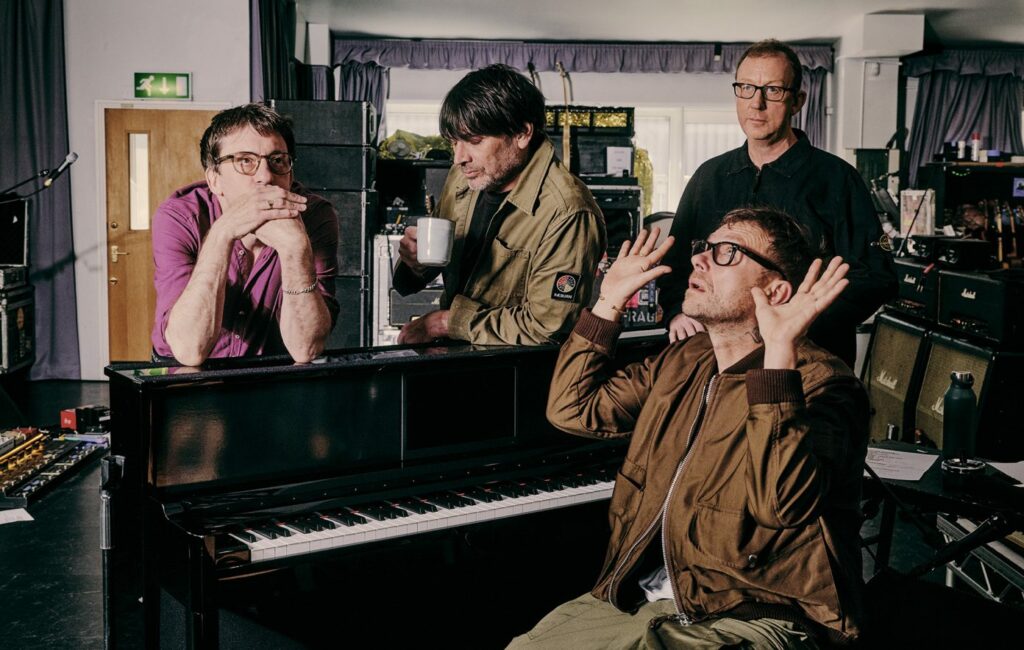Blur, ‘The Ballad Of Darren’ review: a masterful comeback from Britpop icons
On their ninth album, Blur return with a masterly and subtly devastating album that reflects their own here and now.
By Nick Reilly

‘There were moments of joy,” said Alex James of recording The Ballad of Darren, speaking at a recent press conference hours before Blur played their first comeback show to a tiny homecoming crowd in Colchester.
“The fact that we all go off and go down our rabbit holes and come back up again and when we do get back together, we’ve all learnt something… There’s always been something very special about when we play together. It’s there right from the get-go. I feel fulfilled and blessed.”
True to the cheese-loving bassist’s word, here is an album that captures the very essence of Blur’s brilliance, but injects it with a contemporary twist. Damon Albarn’s knack for reflecting on the mundanity of everyday life remains, but that perspective now comes from a man who realises he is no longer the cocksure whippersnapper of Britpop. This isn’t Blur trying to bottle the lightning of their 90s highs, but instead the sound of a band that is trying to convey where they find themselves in 2023.
Suitably then, it begins on a contemplative note. ‘The Ballad’ sees subtle drums being paired against Graham Coxon’s masterfully restrained guitar lines for what feels like Albarn reflecting on his storied career and, unexpectedly, an overwhelming sense of loss. “I just looked into my life / And all I saw was that you’re not coming back,” comes his downbeat opening salvo. He’s vague with the meaning, but a recent interview saw him subtly alluding to the reality of his own recent circumstances.
But the seriousness doesn’t last for long. While ‘St Charles Square’ might see Damon ruminating on recently finding himself living in a “hideous basement“, the sound will instantly transport listeners back to 1997. There’s a squalling guitar blast reminiscent of ‘Beetlebum’, right before Albarn arrives on the scene with a rousing ‘Parklife’-esque cry of “Oi!”. It’s of little surprise that the track has already become a mainstay of their comeback shows this year.
There’s a similar charm on ‘Barbaric’, which bounds along with a warm and familiar groove that proves entirely at odds with the forthright sadness of its lyrics: “To talk to you about what this breakup has done to me / I have lost the feeling that I thought I’d never lose,” Albarn concedes.
Still, not all of the album lands with the same impact. The restrained melodies and oblique lyrics of ‘Russian Strings’ and ‘The Everglades’ feel, at times, like offcuts of Albarn’s solo work. The latter, in fairness, is Albarn’s direct tribute to the late Leonard Cohen after he saw a mural to the great man while recording early demos in his Montreal hotel room, but this doesn’t stop the track from feeling out of place.
In contrast, ‘Goodbye Albert’ is a masterclass in how Blur can find power in the slower moments — with Graham Coxon’s distorted guitar allowing the song to establish distinct ethereal soundscapes. Similarly, lead single ‘The Narcissist’ is a brilliantly powerful ode to the dangers of unchecked egos and one of the best songs they’ve done in years.
For the most part, however, this is an album where Blur return older and wiser, reflecting on the here and now while still managing to retain every ounce of the charm and musicality that made them such a brilliant prospect in the first place. It’s a joy to have them back.
